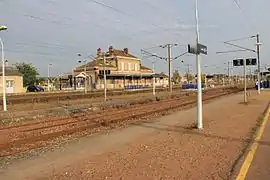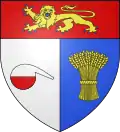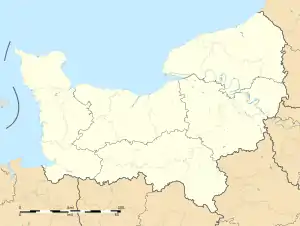Oissel | |
|---|---|
 Oissel railway station | |
 Coat of arms | |
Location of Oissel | |
 Oissel  Oissel | |
| Coordinates: 49°20′33″N 1°05′32″E / 49.3425°N 01.0922°E | |
| Country | France |
| Region | Normandy |
| Department | Seine-Maritime |
| Arrondissement | Rouen |
| Canton | Saint-Étienne-du-Rouvray |
| Intercommunality | Métropole Rouen Normandie |
| Government | |
| • Mayor (2020–2026) | Stéphane Barré[1] |
| Area 1 | 22.19 km2 (8.57 sq mi) |
| Population | 12,367 |
| • Density | 560/km2 (1,400/sq mi) |
| Time zone | UTC+01:00 (CET) |
| • Summer (DST) | UTC+02:00 (CEST) |
| INSEE/Postal code | 76484 /76350 |
| Elevation | 2–128 m (6.6–419.9 ft) (avg. 10 m or 33 ft) |
| 1 French Land Register data, which excludes lakes, ponds, glaciers > 1 km2 (0.386 sq mi or 247 acres) and river estuaries. | |
Oissel (French pronunciation: [wasɛl]) is a commune in the Seine-Maritime department in the Normandy region in northern France.
Geography
A suburban and light industrial town situated by the banks of the river Seine, just 8 miles (13 km) south of Rouen at the junction of the D18 and the D13 roads. Junction 22 of the A13 autoroute is entirely within the commune's borders. SNCF operates a TER rail service here.
History
The area around Oissel were a common place for Viking raiders because of its location on the Seine river, during their raids on Francia. Eventually, the Vikings setteled on one of the islands near Oissel and made it into a base, calling the island "Thorhólmr" meaning "Thor's Island".[3]
During the battle of France, 9 June 1940, the French blew up several bridges and crossings over the Seine river around Oissel to halt the German advance, including Viaduc de Oissel and Pont de Tourville-la-Rivière.[4]
Heraldry
 Arms of Oissel |
The arms of Oissel are blazoned : Per pale argent and azure, a half-filled alembic gules and a garb Or, and on a chief gules, a leopard Or, armed and langued azure.
|
Population
| Year | Pop. | ±% p.a. |
|---|---|---|
| 1968 | 9,949 | — |
| 1975 | 10,501 | +0.77% |
| 1982 | 11,712 | +1.57% |
| 1990 | 11,444 | −0.29% |
| 1999 | 11,053 | −0.39% |
| 2007 | 11,574 | +0.58% |
| 2012 | 11,445 | −0.22% |
| 2017 | 11,895 | +0.77% |
| Source: INSEE[5] | ||
People
- Daniel Horlaville, footballer born in 1945.
- Raoul Grimoin-Sanson (1860–1941), cinematographic inventor.
- Grégory Tafforeau, footballer born in 1976.
- Thierry Foucaud, 1954-, Politician.
Places of interest
- The church of St.Martin, dating from the nineteenth century.
- The sixteenth century manorhouse, the Manoir de La Chapelle.
- The Dambray Pavillon, from the seventeenth century.
- The Château de La Perreuse.
See also
References
- ↑ "Répertoire national des élus: les maires" (in French). data.gouv.fr, Plateforme ouverte des données publiques françaises. 13 September 2022.
- ↑ "Populations légales 2021". The National Institute of Statistics and Economic Studies. 28 December 2023.
- ↑ Hjardar, Kim, "Vikingernes Største Slag", Turbine, 2020
- ↑ Sur l'Île aux Bœufs pendant la première partie de la Seconde Guerre mondiale (https://fr.calameo.com/read/001680599ae22682d5db9)
- ↑ Population en historique depuis 1968, INSEE
External links